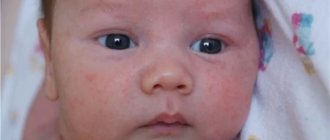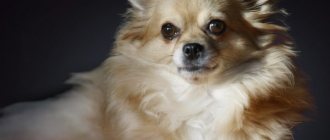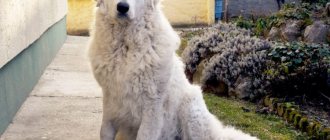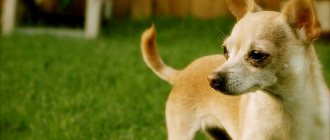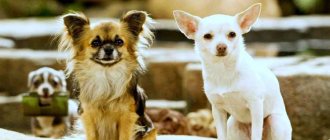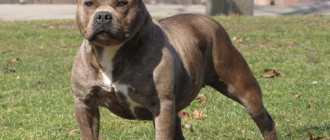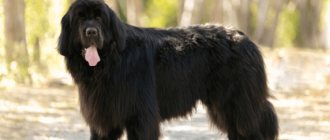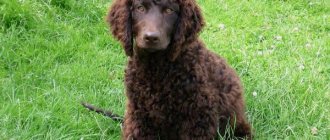Video
* We invite you to watch a video about the Chihuahua . In fact, in front of you is a playlist in which you can select and watch any of 20 videos about a given dog breed by simply clicking on the button in the upper right corner of the window. In addition, the material contains quite a lot of photos. By looking at them you can find out what a Chihuahua looks like.
In this article:
|
Rate the material!
[Total votes: 3 Average: 5]
History of the origin of the Chihuahua
The history of the Chihuahua is very complicated and many origin theories surround it. Folklore and archaeological artifacts indicate that the dogs are of Mexican origin. The most common theory is that Chihuahuas are descended from the Techichi, a companion dog raised by the Toltec civilization in Mexico. There are no records of Techichi before the 9th century, although pots of dogs from Colima, buried as part of a traditional ancient burial ground in western Mexico, date back to 300 BC.
Earlier ancestors of the Chihuahua were present before the Mayans, as similar dogs were found in the Great Pyramid of Cholula, and in ruins on the Yucatan Peninsula. In Mesoamerica, wheeled dog toys featuring apple-headed and deer-headed Chihuahuas are found from Mexico to El Salvador. The earliest of these were discovered in Veracruz and date back to 100 AD. This is indirect evidence that a similar Chihuahua was in Mexico before the arrival of the first Europeans.
Interesting fact: Researchers have not found a connection between Chihuahuas and Asian or European dogs. They found a unique type of Chihuahua DNA in Mexican pre-Columbian samples, suggesting that the breed - its Techichi ancestor - was in Mexico before the arrival of Europeans.
In a letter from 1520, Hernán Cortés described how the Aztecs raised and sold these dogs as food. Colonial records of the small, hairless dogs dating back to the early 19th century claim that 16th-century conquistadors discovered them in the region that later became known as "Chihuahuas."
The dogs were used as living hot water bottles during illness. Perhaps this is why there was an assumption about the transfer of pain to animals from people, which gave way to rituals of burning dogs along with the owner in order to justify the sins of the deceased person.
Story
There are several points of view about the origin of the Chihuahua. According to one of them, the dog descended from a small species of Bailey wolf. Egypt is identified as the birthplace of the breed, claiming that the dogs arose during the construction of the pyramids. The African fox is also considered to be the ancestor of the dog. She is similar to the modern Chihuahua with long ears, large eyes and short stature.
According to the main version, these dogs appeared on the land of the Toltecs, an ancient people, who lived with the Mayans and Aztecs. On the pyramids erected by the tribes, images of small animals similar to a modern specimen were found, and clay figurines in the shape of a dog were also discovered. The Chihuahua breed was then considered sacred; only the rich possessed it.
In the 16th century, the Spaniards began to populate the lands of the Aztecs, who ate animals for food. Then the Chihuahua was forgotten until the 19th century. The Mexican president saved the American breed by giving one Chihuahua puppy in a bouquet of flowers to the famous singer.
Scientists believe that the breed appeared due to the crossing of Techichi (then these dogs were called that) with the same, only hairless Chinese dogs.
Ancient representatives of the Chihuahua breed were distinguished by their lack of voice and long hair.
Chihuahua - description of the breed
Chihuahuas remained rare until the early 20th century. There are two types of Chihuahuas: short-haired and long-haired. Breed standards for this dog usually do not specify height. Only weight and description of general proportions are examined. As a rule, the height ranges from 15 to 23 cm. However, some dogs grow up to 30–38 cm. A Chihuahua should not weigh more than 2.9 kg. The Fédération Cynologique Internationale has set an ideal weight of 1.5 to 3.0 kg, although smaller dogs are also allowed into the ring.
Pet Chihuahuas (that is, those bred or purchased as companions rather than show dogs) often exceed this weight. This does not mean that they are not purebreds, they just do not meet the requirements to participate in the show. Oversized Chihuahuas are found in the best and worst bloodlines. Puppies from the same litter may mature at different sizes from each other. Many breeders try to breed Chihuahuas to be as small as possible. Generally, the breed standard for long-haired and short-haired Chihuahuas will be identical except for the coat description.
Chihuahuas have large, round, very dark eyes, sometimes dark ruby or glowing. Large ears, which are considered a trademark, must be in an upright position. Chihuahua puppies have a soft spot or "molra" on the top of their skull. The body is wobbly and the tail curls over the back or to the side
Interesting fact : There are two types of skulls - “deer” and “apple”. An apple-shaped head is preferable. The terms "deer" and "apple" are names that are used to indicate the difference.
Representatives of the “apple” type with a short nose, wide-set, round and expressive eyes, slightly protruding, with a wide, high forehead. The ears are not large, but are located at a significant distance. The back is straight, the neck is massive, the chest is wide.
The "deer" type has a longer nose. These dogs are elegant and sophisticated. The head is not too large and elongated. The ears are set high. The back is lightened, as is the chest. Paws are thinner. The tail is long.
Character and appearance
Representatives of this breed are calm, but do not always find a common language with other relatives. Despite their miniature size, Chihuahuas are not afraid to run after large animals; there are no authorities for kids. Puppies love to play, while adult dogs prefer peace. They are observant and can follow the actions of their owner for a long time.
The animals easily endure travel and sit quietly in your arms. Chihuahuas are distinguished by their patience and endurance. The breed has good reaction and hearing (recognizes the steps of a person in the entrance). The animal easily adapts to the owner’s mood.
The dog is compact. The head is apple-shaped, with a pronounced transition from the muzzle to the forehead. This is a thin animal with long legs and a medium tail, has large round eyes, wide and erect ears.
Popular Chihuahua colors
According to the standard, a Chihuahua can be of any color - solid, marked or spotted. Colour: fawn, cream, gold, red, white, black, chocolate, silver and blue (dark greyish).
Color markings mean a solid color combined with a few white and/or brownish markings on the face, chest and belly, legs and tail. The brownish markings themselves may be solid, or may be of the sable type (hair with black tips). Mottled coloration means spots on a white background. The blue color ranges from light silver to dark charcoal.
Fun fact: Blue is not a normal color in dogs of this breed, like black, brown or white. There is no blue gene. Instead, the blue Chihuahua inherited the normal black gene + a gene that blurs the black into a grayish hue, which dog lovers call blue.
Unfortunately, blue individuals have a skin problem. Symptoms include gradual thinning or loss of blue hair, plus skin nodules and recurring bacterial infections. A controversial color in Chihuahuas is merle, which is both striking and attractive. Another breed with the merle gene was crossed with the breed, inserting the merle gene into the latter's gene pool.
In the case of the Chihuahua, blue merle dachshunds were likely crossed with him. This essentially means that Merle Chihuahuas are not truly purebreds. But since genetic diversity is a good thing for living things and if you do not consider crossbreeding to be evil, then it is not a problem for you if there are several dachshund genes floating in the merle of your Chihuahua.
But what you should be concerned about is the potential health problems with your Merle Chihuahua. Just as dilution genes act on pigment, turning it lighter, merle genes act on pigment, whitening it.
Unfortunately, this whitening effect is not limited to hair. The pigment in a dog's ears and eyes, an essential pigment needed by nerve endings to conduct auditory and visual impulses, can also pigment. The nerve endings gradually atrophy, which leads to partial or complete loss of hearing and/or partial loss of vision.
Character and habits of the Chihuahua
The Chihuahua is feisty, small, and has a hot tamale temperament. The dog has a big personality hidden in a tiny body. Cheerful, loving and busy, Chihuahuas want to be close to their owners. They follow them everywhere in the house and sit in bags if their owners are out shopping. Chihuahuas often form a close bond with one person, and can become very demanding if spoiled.
Besides being affectionate housemates, Chihuahuas are smart students. They can compete in agility and obedience competitions with the same enthusiasm and success as larger dogs. The best way to achieve success is to convince them that following commands is fun. Chihuahuas are curious and courageous explorers. They can escape from yards through small gaps in the fence because they can squeeze into places that other puppies and dogs do not fit.
Interesting fact: The behavior of a Chihuahua depends on the genetic temperament of its parents and grandparents. Chihuahua owners often find that their dogs are not compatible with small children. Their small size makes dogs delicate and vulnerable to injury and attacks from larger animals.
It is important to socialize your Chihuahua with children, adults and other animals. Chihuahuas are distrustful of strangers, which makes them good guard dogs, but they need to learn to meet people in a friendly manner. It is also important to remember that Chihuahuas tend to forget that they are small and can stand up to a larger, aggressive dog. Therefore, Chihuahuas need vigilant supervision when they are walking or when they are in the yard.
The Chihuahua's personality and unique size make it a wonderful companion. People who live with Chihuahuas become devoted to this breed. They claim that if you get this breed of dog once, there will be no other breeds for you.
Description of features
Each of the representatives of this breed has its own individual disposition and behavior, in which qualities such as, for example, curiosity, playfulness, stubbornness and fearlessness can be combined in different ways. What kind of character a dog will turn out to be is largely determined by its heredity, as well as upbringing and training. But at the same time, there are a number of features characteristic of all Chihuahuas.
The psychology of a dog of this breed is characterized by great emotionality and, despite its small size, endurance and tirelessness. Chihuahuas love to run and play with their owners, however, when playing with such a small pet, owners need to be careful not to accidentally injure him.
Another characteristic of dogs is that they become very attached to their owners and require constant attention from them, which can make them seem intrusive. The Chihuahua does not tolerate loneliness well and does not like to be left alone at home in the apartment, begins to whine and therefore is ready to accompany its owner everywhere. However, their devotion often borders on jealousy: these dogs do not like it when their owners show signs of attention to someone other than themselves.
Representatives of this breed are distinguished by fearlessness and endowed with innate protective qualities.
They are not afraid to engage in battle with an enemy superior in size and are ready to defend their owner or his property without hesitation. Chihuahuas are considered not the simplest pets in character, as they are characterized by stubbornness, jealousy and even selfishness. If raised incorrectly and without socialization, they can become disobedient, capricious and biting dogs. This often happens when the owner of a Chihuahua thinks that a small dog does not need training, and, therefore, there is no need to teach it commands.
And permissiveness also does not have the best effect on the character of the Chihuahua. If you allow a pet of this breed to do whatever he wants, the dog will decide that this is how it should be. Subsequently, this can lead to the fact that the dog will not obey the owner at all and will act exclusively as it sees fit.
But one should not think that Chihuahuas are obstinate dogs that do not want to respect their owners and follow their commands. In fact, these dogs are distinguished by a more stable psyche compared to other decorative breeds; they are sociable and are good at sensing the owner’s mood. If the owner is willing to communicate with the pet, the Chihuahua will play with him with pleasure, and if he is busy with other things, he will wait until they pay attention to her.
Interesting facts about Chihuahuas
Unfortunately, in recent years the Chihuahua breed has become a victim of its own pop success. Potential owners have been deceived into thinking that the dog will not have the same needs as larger breeds. However, they remain a popular companion and favorite toy dog breed.
Let's see what's interesting and unusual about this dog breed:
- The Chihuahua is a long-lived breed, so you should expect to care for it until it is 18 years old;
- When Chihuahuas are cold, they become anxious and fearful. Provide your Chihuahua with a sweater or coat when he goes outside in cold or wet weather;
- Chihuahuas can be unfriendly towards other dogs if they are not socialized when young. Chihuahuas do not back down from large dogs and this can cause problems if they encounter a large aggressive dog;
- A Chihuahua is not the best dog to have if you have small children. They are fragile, and the baby can damage the dog while playing. Most breeders will not sell puppies to homes with children under eight years of age;
- Chihuahuas are happy companions, but they need 20 to 30 minutes of exercise per day and can walk much longer than expected;
- Chihuahuas will rule your life if you let them. They can be destructive when bored and can become picky eaters;
- Chihuahuas have a natural instinct to hide. Whether it's bedding, blankets, towels, pillows or dirty clothes, Chihuahuas will hide under anything. Scientists believe that this instinctive behavior was passed down to the Chihuahua from its Techichi ancestors. When the Techichi roamed Central and North America, they likely burrowed into sand and vegetation for warmth and protection from predators;
- Wild Chihuahuas climbed trees. While most Chihuahuas today prefer to laze around. These little ones were once skilled climbers. They climbed trees and nearly vertical hills like squirrels, seeking warmth and protection from predators.
Adaptability
Chihuahuas are highly active: they willingly play with their owners and love to be the center of attention. These dogs have a special attachment to whichever owner spends more time with them. At the same time, Chihuahuas try to seek attention from all family members without exception and can sometimes seem too intrusive.
These dogs love to accompany their owners everywhere and have nothing against traveling or even traveling together. The small size of representatives of this breed allows Chihuahua owners to take their pet everywhere: to the dacha, on a visit, or, for example, on a shopping trip.
A properly raised and socialized pet of this breed gets along well with children, but adult family members must supervise the child’s play with the dog so that the baby does not cause harm to the animal. In the event that children are still too small and cannot distinguish a live dog from a toy, the best solution would be to protect the Chihuahua from communicating with them until they grow up.
The Chihuahua is distrustful of strangers, and therefore can loudly bark at guests who come to the house.
However, if you let the pet understand that the guest does not pose a danger and has a positive attitude towards the owners, the dog will understand this and quickly calm down. Chihuahuas often show aggression towards other animals and can be cocky towards other people's dogs. At the same time, they can attack even a larger dog without hesitation, and therefore, in order to avoid serious fights, owners need to constantly keep their pet under control during walks and, if possible, avoid conflict situations.
People who decide to have another dog in the house should take into account that Chihuahuas are more loyal to representatives of their own breed. This does not mean at all that she will not be able to get along with a larger dog, but in this case a lot depends on the character traits of the other pet. In any case, in the beginning, conflicts between both dogs are inevitable and the owners need to be ready to intervene at any time to prevent a fight between them.
Pros and cons of Chihuahuas
Since this is a small dog, there are many things you need to take into account. Before choosing this cute fluffy dog, you need to analyze all the pros and cons.
Pros of owning a Chihuahua:
- Chihuahuas are adorable and cute. These are the cutest dogs I have ever seen. They fit easily on your hand or knees. Very loyal to people and caring. It's fun to be with them and watch them play for a long time. They love unconditionally;
- Excellent for apartment living. Chihuahuas do not require large areas or fields to play. Your home can provide him with plenty of space to run, walk, and exercise;
- Good guard dogs. Chihuahuas have excellent eyesight and hearing, and having them in the house ensures safety. They will warn if a stranger enters or breaks into the house;
- They train well and are easily litter trained. Having tried the tray once, they begin to go there constantly;
- Caring for a Chihuahua takes a few minutes;
- Your tailed friend will stay with you and delight you from 11 to 20 years;
- Traveling with these cute, fluffy dogs is easy. They are so small that they can fit in a handbag;
- These are smart dogs.
Disadvantages of owning a Chihuahua:
- The Chihuahua is a weak dog and can easily get injured. They can even get hurt if they fall off the sofa, so extra care must be taken;
- Chihuahuas have a hard time surviving in cold weather. They love warm climates;
- Chihuahuas tend to become attached to one person in the family. If they feel threatened, they may bite;
- A Chihuahua is not the best choice of pet if you live in a place where quiet is required. They bark a lot;
- The breed is very sensitive and may have health problems;
- Chihuahuas may not get along well with other animals.
They are susceptible to eye injuries, so think twice before having a cat at home.
Chihuahua and small children
In principle, Chihuahuas get along well with children. Although it is better to protect children from these fragile animals. But if you still decide to buy such a dog and there are young children in the house, it is worth familiarizing yourself with some rules for their life together.
Namely, you need to clearly explain to the baby that this dog needs to be handled extremely carefully. And even after this, you should constantly monitor when the child establishes contact with the dog.
Some tips that will help in keeping a dog in a house with a child:
- It is necessary to accustom the dog to a daily routine so that it does not wander around the house when the child falls asleep;
- The dog should be taught the “be silent” command. After all, as already mentioned, when a Chihuahua feels that someone is approaching the house, it creates a lot of noise. The “keep quiet” command will help pacify the dog when the child falls asleep;
- Never give your dog a toy in the shape of a child; these can be various dolls. There have been cases when a dog confused a toy with a living child and caused harm to him;
- When there is already a dog in the house and a newborn baby appears, you need to introduce them. You should hold your dog tightly, as his reaction may vary. There are dogs that react aggressively to a new family member. And there are those who, on the contrary, try to make friends with the baby;
- Even if the dog has good intentions, you should not let it play with the child. Even though the baby may like it;
- Before buying a dog, you should make sure that the child is not allergic to wool.
Important: Before buying a dog, you need to give your child full instructions on how he should handle it.
Chihuahua breeding
Chihuahua breeding is defined as the planning and arranging of the crossing of two purebred Chihuahua dogs to produce a litter of Chihuahua puppies, following the strict rules established by the official breed standard.
Chihuahua breeding should always offer a clear or subtle improvement over the previous generation. A Chihuahua breeder does not simply breed for the sake of breeding or profit, he must breed the breed with clear short and long term measurable goals.
Chihuahuas are not the easiest breed to work with. They are small dogs that are prone to a number of health problems, but they are indeed highly prized, making the breed very attractive to the passionate breeder. When breeding Chihuahuas, the main goal is to reduce various health risks through careful monitoring.
Fun Fact: The average litter size of Chihuahua puppies is between one and three. Four puppies and older is possible, but rare.
The Chihuahua breed, like other small and toy dogs, tends to reach puberty earlier than larger dogs. Typically about 6 months. Like any other dog breed, female Chihuahuas should never be bred during their first two or three heats because fertility is not high enough for a successful and smooth pregnancy. Male Chihuahuas should be used for breeding as soon as they are fully mature, usually after a year or two.
Chihuahua care
It is best to bathe your Chihuahua once a month or every six weeks. Don't bathe your Chihuahua too often as this will cause dry, flaky skin. When bathing your dog, avoid getting shampoo in the eyes. Rinse the shampoo thoroughly from your Chihuahua's coat without leaving any residue; any remaining shampoo may irritate your dog's sensitive skin. Dry your dog completely after bathing before taking him outside. Wipe your dog's ears with a dry, clean towel after bathing. The accumulation of moisture in the ears can cause an ear infection.
Trim your Chihuahua's nails as soon as you hear a clicking sound when he walks on linoleum or wood floors. Nails that do not respond to regular trimming will begin to curl and grow into the balls of the feet, a serious problem that will affect the dog's gait and cause him severe pain. Use only dog trimmers.
Fun fact: A Chihuahua with healthy ears will not bark at them or produce a foul odor. If your dog scratches his ears with his paws, he may have ear mites. If you notice any problems with the ears, take your dog to the vet to avoid serious problems in the future.
Keep the area around your Chihuahua's eyes clean by regularly wiping the area with a clean, damp cloth or tissue. Do not use the same cloth on both eyes. Small dog breeds are prone to crowded teeth. Food particles can easily get stuck between teeth and cause bacteria to form into tartar if teeth are not brushed daily. Start brushing your teeth when your puppy is still young so that your Chihuahua gets used to the procedure.
For the first few days, don't use toothpaste, just get your dog used to having his teeth massaged with a finger brush. After about a week, start adding a small amount of dog toothpaste. Never use human toothpaste on your dog as it is hazardous to his health.
The Chihuahua breed does not like cold weather. Short-haired Chihuahuas are especially vulnerable to cool weather, and owners should keep the dog warm when going outside for walks. Avoid walking your Chihuahua for long periods of time in cold temperatures. When the weather gets cooler, dress your tiny dog in appropriate winter clothing. If your Chihuahua is shaking or lifting his feet one after the other, the dog may be too cold and should be placed in a warm environment immediately.
Features of temperament
Representatives of the Chihuahua breed have a very strong character. Unlike other breeds of small dogs, Chihuahuas are not afraid of anything and do not shake at the slightest rustle. Don't allow yourself to panic. They behave nobly and will not allow themselves to be offended. Many things are looked down upon.
It has been said that Chihuahuas can detect a person's mood. It's all because of the dog's curiosity. In addition to her interest in the environment, she is interested in human behavior. She is interested in even the most boring human activities: reading a book, watching TV. The Chihuahua closely monitors the owner and analyzes his behavior. In the future, this helps them sense the owner’s mood.
Chihuahuas are very active dogs. They like to run around the entire apartment and take walks. Many owners prefer to train their dog to use the indoor toilet, but they should not deny their Chihuahua a walk. They really miss outdoor walks.
Scientists have found that Chihuahuas with long and short hair have different temperaments. Long-haired Chihuahuas have a gentler personality. They are kind and peaceful. This short-haired breed has a core character. They are more likely to show anger and aggression. This does not happen towards their beloved owner, because they are too loyal. They are mostly aggressive outdoors. They show their aggression towards other dogs and passers-by.
It's funny, but Chihuahuas are always ready to protect their owner and his family. They even rush at enemies much stronger than themselves. Therefore, it is worth keeping an eye on your dog on the street. There were cases when a dog, thinking that its beloved owner was in danger from a representative of a large breed, rushed at the large dog and died. They are not afraid of pain. For them, the main thing is the safety of those they love. They also warn the owner with a loud bark.
A bad quality of a Chihuahua is uncontrolled urination. They are not very shy, but if they are scared, an incident can happen. Therefore, you should not frighten your dog at home, because no one wants to wipe up his puddle, even if it’s small.
Good to know: What to feed a Chihuahua: a healthy diet for a puppy
Touchiness is also a negative quality of the Chihuahua. As an educational moment, if the owner has done something unacceptable, the dog goes to its place and pointedly ignores the owner. Many things can offend her: raising your voice at her, ridicule, or any other behavior that offends her. They are not offended for long, more to show that such treatment is unworthy of a Chihuahua. Usually they go to the meeting themselves, trying to resolve the conflict situation.
Chihuahua diet
Keeping your Chihuahua healthy starts with a balanced diet. The quality of food offered will affect energy levels and muscle maintenance, and will have a direct impact on both short-term and long-term health.
Small meals are best for Chihuahuas.
The exact timing and frequency will depend on age:
- For puppies up to 3 months or up to 2 kg, it is recommended to feed by leaving food available at any time, around the clock. Food should be renewed several times a day;
- Adult Chihuahuas and puppies, starting from 3 months (weighing at least 2 kg): should have 3 meals a day + several snacks between meals.
When you're feeding 3 times a day, there's a good chance you won't be home for mid-day feedings. You can leave food in a dish for your Chihuahua, although keep in mind that he may play with it rather than eat it, or knock it over and scatter it.
The correct amount of food for a Chihuahua depends on the individual calorie requirements of the puppy or dog. This may vary slightly and depends on the dog's activity level, exact age, health status, and even the weather (dogs tend to eat more in the winter). In general, the calorie requirement for puppies is about 50 calories per 1 pound of body weight, and for adult Chihuahuas it is between 35 and 40 calories.
The correct portion size for a Chihuahua also varies depending on what type of food is served (wet vs. dry, chicken vs. beef, etc.). But in general, you can expect your Chihuahua to eat very small amounts. Small-sized Chihuahuas eat about 1/2 to 1 and 1/3 cup per day (split into as many meals as you like, which should be three in most cases). Larger Chihuahuas require larger portions.
Fun fact: In most cases, the recommendations on dog food packaging are pretty accurate. This depends on age and weight and assumes the dog has several snacks per day.
A Chihuahua that is fed good food will have a shiny coat, no skin problems, bright eyes, good energy levels, and the dog will simply thrive.
Diseases and health problems
Chihuahuas do not have any serious health problems, but like all breeds, they can be born with or acquire certain medical conditions. Not all Chihuahuas will get these diseases, but it is important to know about them so you can be informed. Both parents must have medical certificates and documents. Medical permits are not issued until 2 years. This is because some health problems occur in dogs after they reach full maturity.
The following diseases can affect Chihuahuas:
- Stifle dislocation, known as "slip knees" is a common problem in small dogs. Caused by problems with the three-part patella that is not aligned correctly. This causes lameness or abnormal gait, such as skipping or skipping. Chafing can lead to degenerative joint damage and arthritis;
- Hypoglycemia (low sugar) is a possible problem for all toy breed puppies. Hypoglycemia is easily treated in its early stages, but can be fatal if left untreated;
- Heart murmurs are associated with impaired blood flow through the chambers of the heart. They show that there may be a serious heart condition that needs to be monitored and treated;
- Pulmonary stenosis is a congenital heart disease that occurs when blood does not flow properly through the heart because the pulmonary valve is abnormally shaped, causing an obstruction;
- Collapsed trachea: It is not entirely clear how this occurs, but rapidly inhaling air flattens the trachea and makes it difficult for air to enter the lungs;
- Hydrocephalus. Cerebrospinal fluid (CSF) can accumulate in the brain due to a birth defect, obstruction, or injury during childbirth, putting pressure on the brain. The head appears swollen or enlarged.
